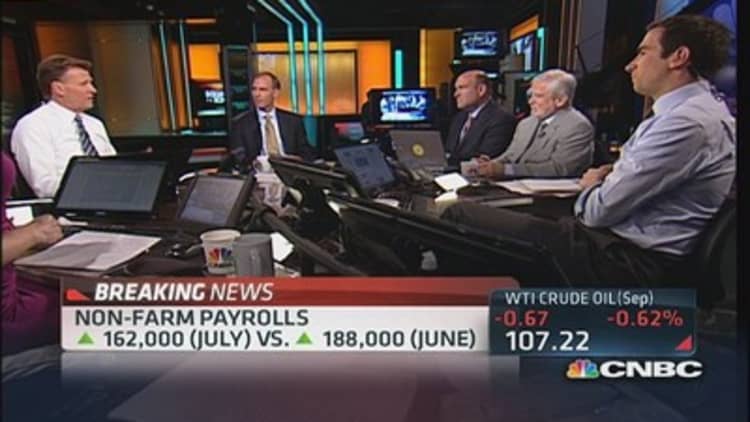Well that was a disappointment: July nonfarm payrolls, at 162,000, checked in well below consensus estimates of 185,000 — and under the whisper number of 200,000-plus.
The bulls were eager for a strong nonfarm payroll report to argue that the economy had reached "escape velocity." That's not happening, at least not yet. The downward revisions in the two prior months were also a disappointment.

True, the unemployment rate dropped to 7.4 percent, the lowest level since December 2008, but so did the labor force participation rate. The papers on Saturday are more likely to say, "Jobs number comes in weaker than expected" than "Unemployment drops to 4-year low."
So where are we?
August data points will be decisive in deciding whether the Federal Reserve tapers in September. My sense is that assuming Europe and China doesn't blow up, slow progress might be enough. There is still a good chance the Fed may begin the tapering process in September: some central bankers seem to think the risks of maintaining the program outweigh the benefits.
We might get more insight into this on Friday, when St. Louis Fed President James Bullard's, an FOMC voting member and a moderate, speaks at 12:15 PM Eastern.
Back to the question—where are we, or more specifically, where do stocks go from here?
1) monetary policy will remain accomodative for a long time; we may argue when the taper will begin, but its end is a long way off, and the Fed raising rates are even farther off;
2) the macro environment is quiet: talk is of Europe bottoming and China maintaining; Japan is still a wild card as reforms could go either way;
3) earnings are fair but not great, with expectations of modest improvement in the second half; and
4) corporate balance sheets are strong, and valuations are not stretched.
The above still argues for stocks over bonds.
Elsewhere:
1) Chevron was the third big oil company to come up short on earnings, after and Royal Dutch Shell. Chevron's profits were down 26 percent, and like Exxon they blamed much of the problem on lower refining profits.
I noted yesterday that all the large oil companies have the same problem: they have problems growing because of the nature of the business, i.e. they keep eating their seed corn. One analyst told me that XOM pumps some 4 million barrels of oil a day, but loses 6 percent of production each year (240,000 barrels). It's getting increasingly difficult to replace those 246,000 barrels.
2) Stocks keep collecting money. Stock mutual funds see 30th straight week of inflows in week ended Wednesday, reports Lipper.
—By CNBC's Bob Pisani


